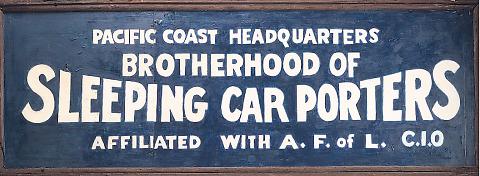H80.57.1
(184.15 cm HIGH x 66.67 cm WIDE)
Sign, painted metal/wooden frame. Description: "Pacific Coast Headquarters Brotherhood of Sleeping Car Porters Affiliated with A.F. of L. C.I.O." painted white letters on deep aqua. Wooden frame with metal plates at corners. History: Originally placed over doorway at 7th Street headquarters in the early 1930's. From the History Information Station: Object: Metal sign, painted blue with white lettering: "Pacific Coast Headquarters, Brotherhood of Sleeping Car Porters. Affiliated with A.F. of L. C.I.O." History: This sign hung outside the Pullman car porters' union hall in Oakland. The porters' union, formed in 1925, was in the vanguard of the fight for racial equality. In 1941 the union organized a march on Washington to call for President Franklin Roosevelt to sign an order banning race discrimination in war industries. It also helped organize the march on Washington in 1963. During its first few years, Pullman porters were fired if they joined the Brotherhood. The Pullman company, which owned the cars and employed the porters, did not recognize the union until 1937. One of the union's more famous founders, C. L. Dellums of Oakland, served for over 30 years as vice president, and became its president in 1968. Gift of C. L. Dellums The Brotherhood of Sleeping Car Porters The African American porters on the Pullman railroad cars were a distinguished group of men. Their jobs required that they provide calm, courteous service no matter how unreasonable a passenger might become. Their status within the African American community was high, in part because these men were symbols of white collar work--a necktie, white shirt, and shined shoes--and in part because of their wide experiences in travelling. Sleeping car porters were an important source of news about job opportunities for African Americans around the country. An important benefit of the porter's job was the steady salary, in contrast to most other jobs open to African Americans. Pullman porters were able to prosper financially from their work. The work was very hard: the wages were only 50 cents a day in 1872, and went up slowly thereafter, and hours could exceed 400 a month. The Brotherhood of Sleeping Car Porters formed in 1925 to fight for better wages and more reasonable working hours. It became a successful and powerful union, expanding its influence t to fight for equality and civil rights on a national level.


